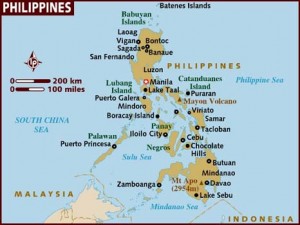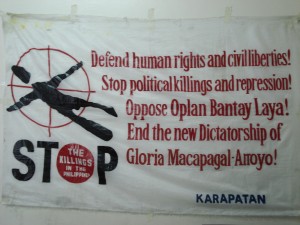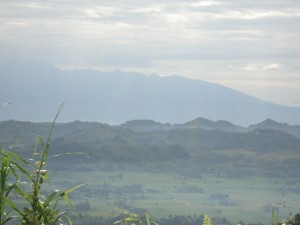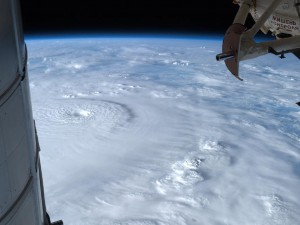A Deadly Typhoon Strikes the Philippines- and it’s not Typhoon Pablo
A reflection from the Philippines by Norma P. Dollaga, a deaconess serving The United Methodist Church in the Philippines. Her organization KASIMBAYAN is a member of EcuVoice, the Ecumenical Voice for Peace and Human Rights in the Philippines, a KAIROS partner in the Philippines since 2001.
Background to Deaconess Norma’s reflection: On December 3, super typhoon “Pablo” (also called “Bopha” by some agencies) struck the Philippines, with sustained winds greater than 240 kph — the equivalent of a Category 5 hurricane in the Atlantic Ocean.
 As of December 9th, a Philippine agency provided this report on the impact of Typhoon Pablo in Mindanao, the southernmost large island in the Philippines archipelago:
As of December 9th, a Philippine agency provided this report on the impact of Typhoon Pablo in Mindanao, the southernmost large island in the Philippines archipelago:
- December 7, 2012, President Benigno S. Aquino declared a State of National Calamity
- 1,096,633 families / 5,408,229 persons were affected
- 647 confirmed dead; 1,088 injured; 827 missing
- 21 municipalities and cities are experiencing power interruption and 6 areas are experiencing interruptions in water supply.
Norma writes:“Pablo” hits Mindanao.
Raging, briskly dancing, setting its own pace and leaving hundreds of people dead and still counting, razed down infrastructures. He commanded the mortals to show compassion and love, and reminded us all that the emotional attachment unto our kin and kith and death no matter how real, can be a astounding moment.
The moment of truth comes again, inviting the human community to respond mercifully and justly. Blaming the victims is the most insensitive thing to do. Taking advantage of their misery like imposing value added tax, increasing the cost of commodities. Exploiting the situation for political-electoral campaign is a sin almost unforgivable.The act of mercy and charity is exceedingly needed. Fortunately, generosity amongst people is not hard to find in our country and people across the world. The act of justice is totally needed, for the disaster speaks well about policies, inequalities, exploitation, environmental plunder and development aggression. Justice is hard to find but still is possible. It would take a social-political overhaul to realize this.
Just before the forecast of this super typhoon, Mindanao was being devastated not by the normal visits of storms but by storms created by corporate greediness , human rights violations and environmental destruction courtesy of profit-driven mining operations and explorations.
To date, under the present watch of the current administration there are already 34 environmental advocates killed in Mindanao. Twenty-six of them are Lumad Indigenous people. 159 anti-mining advocates and human rights defenders are facing trumped-up charges. They are being tagged as insurgents and rebel sympathizers. Indigenous peoples and peasant communities become victims of enforced displacements due to military operations leading to more than a thousand families affected. Schools become virtual garrisons as military personnel and war equipment are stationed there.

This photo was taken in 2007, under a different national government. Little has changed for human rights and ecological advocates. Photo: Connie Sorio/ KAIROS
Before typhoon Pablo visited Mindanao, a family was massacred weeks before All Saint’s Day. On the morning of October 18, 2012, Jordan, a 12 year old school boy in his school uniform, was taking his last sip of coffee and readying to leave for school. Then a burst of gunfire and rampage of strafing broke out. After the gunfire, Jordan, his pregnant mother Juvy and a sibling JanJan, 7 were killed. Another sibling Vicky, age 5, was wounded but survived. Her auntie who tried to rescue them heard the elements of the Armed Forces of the Philippines saying, “Let us finish her off so there would be no witness.” Thankfully, the community members immediately came so the soldiers were not able to kill the surviving child. A devastating episode happened also to the Liguyon family. Sharon Liguyon and her husband and Barangay Captain Jimmy Liguyon were strong advocates of environmental protection and were against the intrusion of destructive mining activities and bio-fuel plantations in their local area. On March 5, 2012, Jimmy Liguyon was shot dead right inside their house. Jimmy at that time was the Vice-Chairperson of a regional indigenous peoples’ group in Mindanao, local church Council Chairperson of the United Church of Christ in the Philippines, and Datu (tribal elder) of the Matisalog tribe. Sharon and her family among those internally displaced peoples. She is seeking for justice for her slain husband but until now, the wheel of judgement is not moving.
Mindanao is blessed with natural resources. Its wealth can sustain and nourish its people if only the resources are justly shared and science and technology are appropriated for the welfare of the people and the natural world.

Mindanao is a beautiful island with rich cultures and history. Like millions of other Filipinos and Filipinas, its peoples long for an end to violence and ecological devastation. Photo: KAIROS/ Connie Sorio
While typhoons and calamities are occurrences over which we do not have any control, an unjust structural system can cause [equally] grave devastation on the people. Laws and policies, and a market-driven economy that cater to the economic interests of big business do not only invite disaster; they are in themselves disasters taking the lives of the people and the capacity of nature to provide for the needs of all. Those who advocate for the care of creation are killed, harassed and tagged as supporters of the revolutionary movement, which in the present context are considered by the state as terrorists. The truth is communities are suffering and become disintegrated even if they do not oppose development aggression. They are driven away, displaced from their source of livelihood, young children are killed, boys and girls are denied access to proper education.
This is the storm, destructive and deadly.
Typhoon Pablo may leave us mourning the dead, lamenting the destruction our eyes have witnessed. Another typhoon may come, as it is part of nature.
We cannot command the typhoon but we can lessen the vulnerability of the people. Typhoons come and go, and generosity is tested in times of its visits. But there is a storm greater than a typhoon—injustice, inequality, exploitation and development aggression.
Norma P. Dollaga
Kapatirang Simbahan Para sa Bayan
(KASIMBAYAN)
Dec. 7,2012

